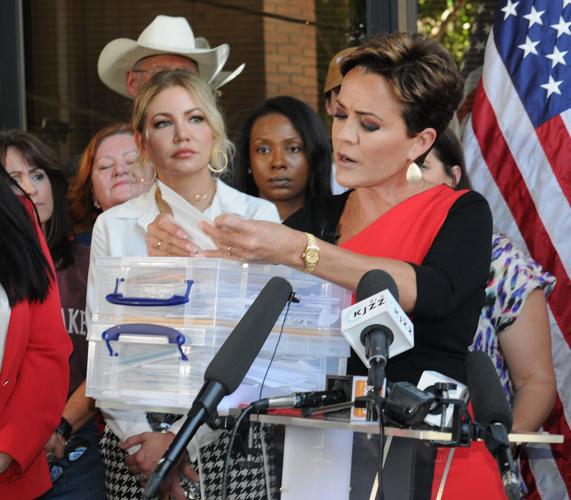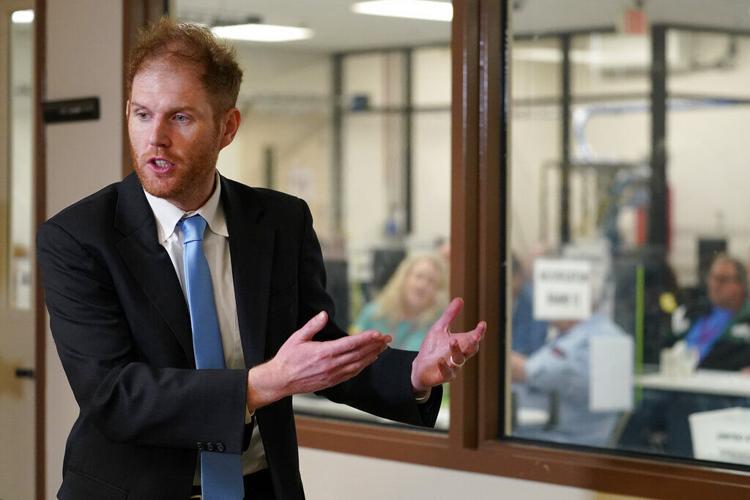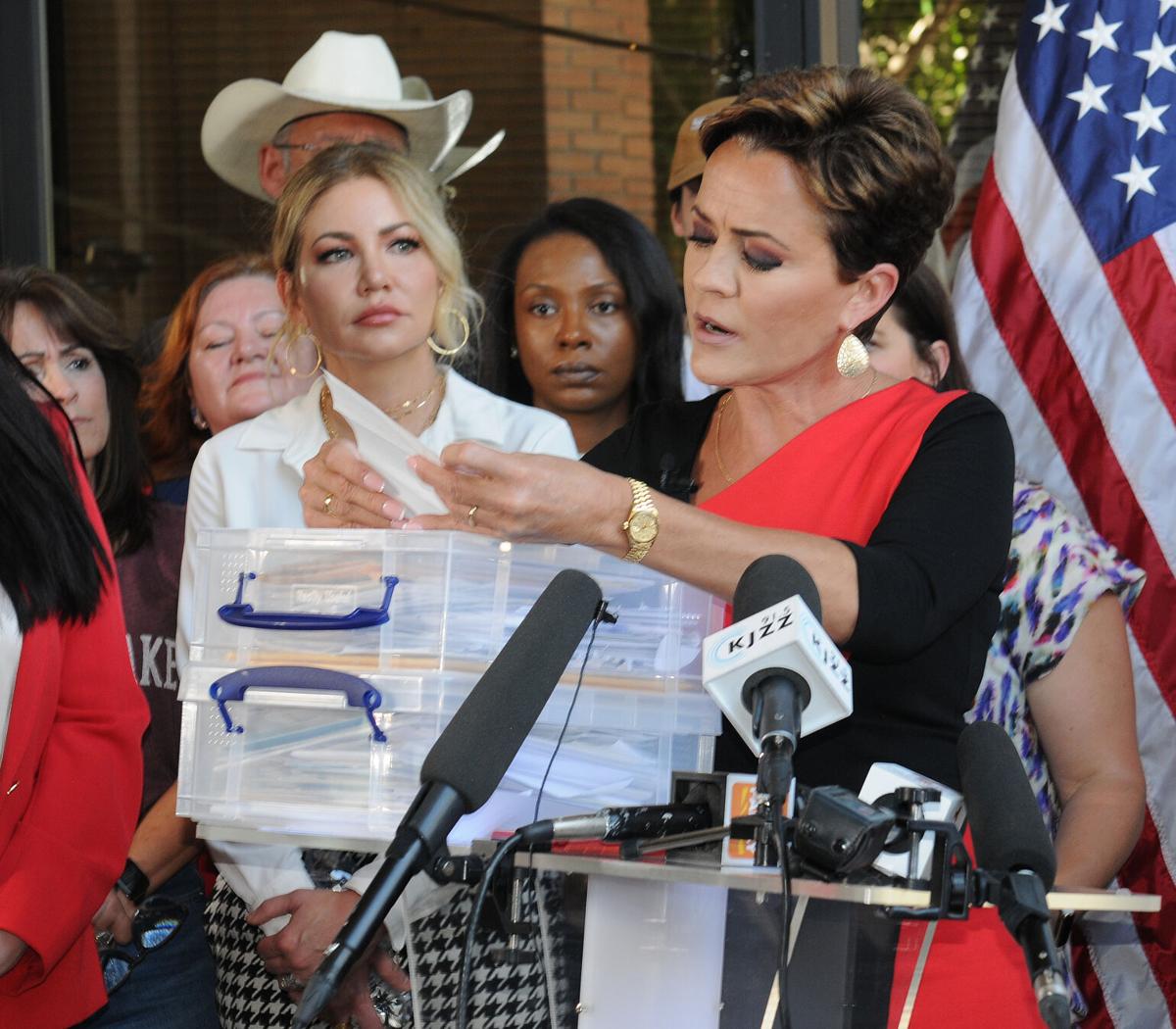PHOENIX — Kari Lake will now have to prove the charges she leveled against Maricopa County Recorder Stephen Richer are true to avoid being found guilty of defaming him.
In an extensive ruling Wednesday, a Maricopa County judge said it is clear the claims made by Lake, the failed Republican candidate for governor, that Richer sabotaged the election were not, as her lawyers claim, “mere rhetorical hyperbole.’’
“In point of fact, defendant Lake’s statements regarding improper 19-inch ballots and/or the existence of 300,000 fraudulent ballots may be discerned by a factfinder as either true or false when considered in the light of any available evidence. These statements constitute assertions of fact that are actionable under prevailing Arizona law,” Superior Court Judge Jay Adleman wrote in allowing Richer’s defamation lawsuit against Lake to go forward.
That means the burden is now on Lake to back up, in court, what she said about him — and she has been unable to prove her claims in her legal efforts to get any court to overturn her 2022 election loss to Democrat Katie Hobbs by more than 17,000 votes.
“Actual malice”
And there’s something else.
Adleman said Richer has enough allegations in his lawsuit against Lake, her campaign and the Save Arizona Fund she has used to raise cash, to provide a basis to show she acted with “actual malice.”
That is critical.

Maricopa County Recorder Stephen Richer
The U.S. Supreme Court has ruled that people who are considered public figures, like Richer, who is an elected Republican official, cannot sue for defamation unless they can prove by clear and convincing evidence that the statements were made with actual malice. In general, that means the person making the statement knew it to be false or that the statement was made with a reckless disregard for the truth.
Wednesday’s ruling clears the way for a trial.
“Endless and vile threats”
Richer, in a written statement, said he was pleased he will get to present his case to a jury.
“My family and I have faced endless and vile threats, including calls for our execution, and I’ve lost important personal relationships and seen my reputation severely damaged by defendants,” he said.
“Working as a public servant should not lead to death threats, harassment or defamation,” Richer continued. “No one is above the rule of law in this country.”
Lake, in a post Wednesday on X, formerly Twitter, doubled down on her allegations, saying Richer is “suing me for revealing the corruption in the elections he administered.’’
“This is about taking away our First Amendment rights and interfering in the U.S. Senate race,’’ she said, a reference to her bid for the GOP nomination for that seat in 2024. “This case should have been tossed out of court.’’
The claims
The case involves two separate claims made repeatedly by Lake about her loss and what she said was Richer’s role.
One involves problems in Maricopa County on Election Day.
The county, like several others, uses vote centers. That allows any registered voter to cast a ballot at any location rather than just their home precinct.
That, in turn, requires the ability to print 20-inch ballots on site that are specific to each voter, listing only those races applicable to that voter such as city council, school board, Legislature and Congress.
What happened is that many of the printers — the number is in dispute — spit out images designed to go on 19-inch paper. That made them unreadable by the tabulators, which spit them back out. Long lines ensued at the vote centers.
Lake charged that Richer and others did that deliberately, knowing that Republicans are more like to vote on Election Day than Democrats who tend to cast early ballots. She said that some people, rather than wait in lines, simply left without voting, contributing to her loss.
“They realize that they couldn’t cheat in some of the other ways that they cheated before so they had to do something as diabolical as intentionally printing the wrong image on the ballot on Election Day only,’’ Lake said in a Twitter Space broadcast in April, one of the claims cited by Richer in his lawsuit. “The only way they can win these days is to cheat elections.’’
But Richer, in his lawsuit, pointed out that neither he nor his office was responsible for Election Day operations but only for early voting. That was the responsibility of the Republican-led Maricopa County Board of Supervisors.
Enough evidence for jury to decide
Judge Adleman also took note of something else.
The county had asked Ruth McGregor, a retired Supreme Court chief justice, to look into the issue of the ballot-size problems.
“Although separating related causes is always difficult, in my judgment, the primary cause of the Election Day failures was equipment failure,’’ McGregor wrote, not intentional acts. That report was published in April, before Lake made some of her charges.
The judge said that provides enough evidence for a jury to decide whether Lake’s claims amounted to defamation.
Then there’s Lake’s claim Richer “injected’’ about 300,000 “phony’’ early ballots received on Election Day into the final vote count, including at one point saying that “they had to sabotage Election Day.’’
Richer, however, pointed out that Lake had made similar claims of intentional misconduct about the ballots to a trial judge who was considering her bid to overturn the election. And in that case, Richer said, the judge found “nothing to substantiate’’ Lake’s claim of intentional misconduct — a ruling that was made months before Lake made her comments charging Richer with sabotaging the election.
Here, too, the judge said, that allows Richer to force Lake to prove her statements in a defamation lawsuit.
The judge made a special note to reject Lake’s contention that she was entitled to have the lawsuit dismissed right now, before any evidence was presented, based on the state’s anti-SLAPP law.
It is designed to provide protections for those sued by government officials, allowing them to avoid having to go through the time and expense of a trial. But it first requires a defendant to show that the public official sued primarily “to deter, retaliate against or prevent the lawful exercise of a constitutional right.’’ Adleman said Lake did not prove Richer sued to keep her from speaking out.






